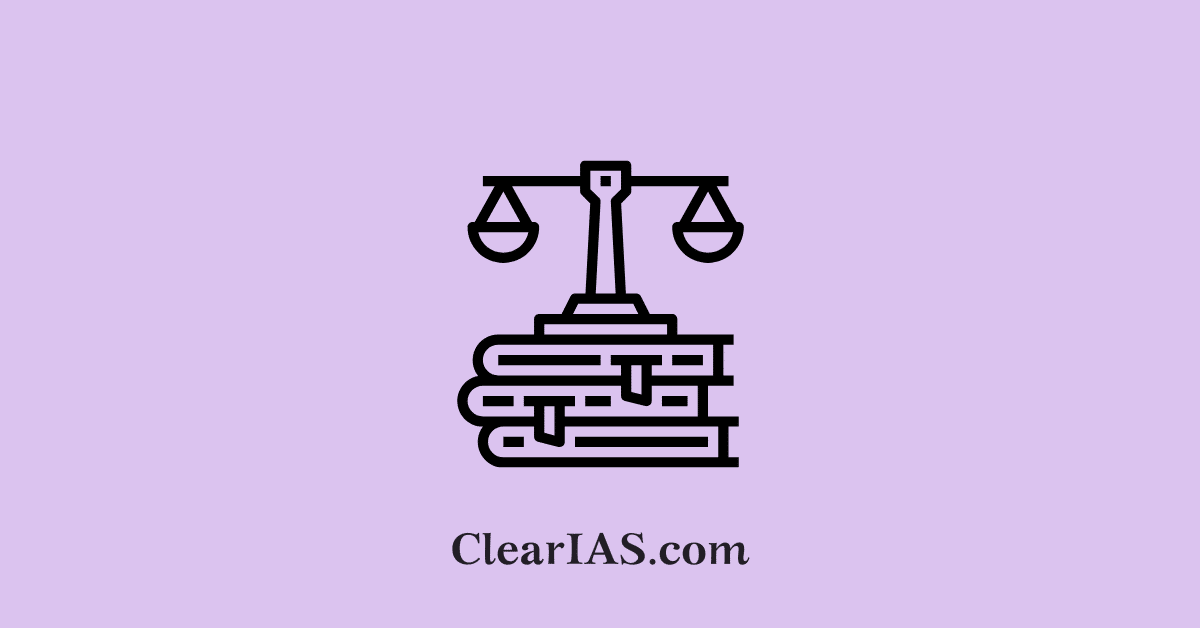
Constitutional morality goes beyond mere compliance with the law, and involves a deeper commitment to the values, spirit and ethos of the constitution. Read here to learn more.
The idea of constitutional morality lies at the heart of India’s democratic ethos. It is not merely about the written provisions of the Constitution but about the spirit that animates them, the ethical compass that must guide lawmakers, judges, and citizens alike.
As India navigates an era of political polarization, social fragmentation, and institutional contestations, the ceaseless cultivation of constitutional morality has become more vital than ever.
The Philosophical Roots of Morality and Law
The relationship between law and morality has been one of the oldest inquiries in legal philosophy.
- Thinkers such as L.A. Hart and Lord Devlin debated whether the law should enforce moral values.
- Hart argued for a distinction between private morality and public law, whereas Devlin believed that societal morality forms the foundation of law itself.
In the Indian context, however, the boundary between law and morality has always been porous.
- Ancient Indian jurisprudence fused them under the umbrella of Dharma, a comprehensive concept encompassing law, morality, and righteous conduct.
- Texts like the Manusmriti, Arthashastra, and the Tirukkural emphasized Aram (virtue) as the foundation of governance and justice.
- This synthesis of law and moral principle found new expression in the modern Indian Constitution.
Meaning of Constitutional Morality
The term “constitutional morality” was first used by Dr B.R. Ambedkar, who borrowed it from the writings of the British historian George Grote, known for his work on Athenian democracy.
Ambedkar described constitutional morality as the “paramount allegiance to the Constitution and its methods,” emphasizing that the success of constitutional democracy depends on the people’s and institutions’ adherence not merely to the letter but also the spirit of the Constitution.
At its core, constitutional morality requires:
- Respect for constitutional principles such as liberty, equality, fraternity, and justice.
- Adherence to institutional propriety, where public officials act within the bounds of their constitutional authority.
- Tolerance of dissent and protection of minority rights.
- Commitment to constitutional processes, even in the face of political pressure or populist demand.
Thus, constitutional morality is not a static doctrine; it is a dynamic ethical commitment that ensures democracy functions with legitimacy and fairness.
Judicial Evolution of Constitutional Morality in India
Over time, the Indian judiciary has played a key role in articulating and expanding the meaning of constitutional morality.
- P. Rathinam vs Union of India (1994): The Supreme Court, quoting Justice Frankfurter, held that law embodies moral principles based on fairness, justice, and righteousness, linking legal legitimacy with moral integrity.
- Naz Foundation vs Government of NCT of Delhi (2009): The Delhi High Court invoked constitutional morality to strike down Section 377 of the IPC, emphasizing that constitutional morality must trump public or social morality.
- Navtej Singh Johar vs Union of India (2018): The Supreme Court reaffirmed this view, declaring that the Constitution protects individual dignity and choice even if societal morality disapproves.
- Government of NCT of Delhi vs Union of India (2018): The Court held that constitutional morality requires power to be exercised within constitutional limits, protecting the spirit of federalism and democracy.
- Sabarimala Case (2018): The Court relied on constitutional morality to ensure gender equality in religious practices, even at the cost of overturning long-standing traditions.
These judgments highlight that constitutional morality serves as a moral compass for governance, ensuring that fundamental rights and constitutional values override majoritarian impulses.
Constitutional Functionaries and the Moral Code
Constitutional morality imposes a special duty on constitutional functionaries, legislators, executives, and judges to act with integrity, restraint, and respect for the separation of powers.
It demands adherence to rules of constitutional propriety, ensuring that no branch of government transgresses into another’s domain.
For instance:
- Legislators must uphold deliberative democracy, avoiding populist excesses or divisive rhetoric.
- Executives must act transparently and within the rule of law, not through ordinances or coercive powers.
- The judiciary must exercise restraint and avoid judicial overreach while ensuring constitutional supremacy.
As Ambedkar warned in the Constituent Assembly, even a perfect constitution can fail if its custodians lack constitutional morality.
Contemporary Relevance
In recent years, challenges such as majoritarian populism, judicial politicization, erosion of institutional independence, and intolerance of dissent have tested India’s constitutional fabric.
- Social media polarization and populist politics often distort constitutional values in favor of short-term political gains.
- In this environment, constitutional morality becomes a safeguard against tyranny, reminding citizens and leaders that democracy is not merely about electoral victories but about adherence to due process, equality, and justice.
- It also places a moral responsibility on citizens, not just officials, to internalize constitutional values in everyday life.
- As the Supreme Court noted in Kesavananda Bharati (1973), the Constitution is not a mere legal document but a vehicle of national transformation. That transformation can only be sustained through moral and civic consciousness.
Conclusion
Constitutional morality is the invisible force that animates India’s democracy, the soul that breathes life into the constitutional text. It demands discipline from rulers, respect from citizens, and integrity from institutions.
In the final analysis, law alone cannot ensure justice; it must be guided by morality. The ceaseless cultivation of constitutional morality among citizens, lawmakers, and judges is, therefore, essential to preserve the democratic ideals envisioned by the framers of the Constitution.
As Ambedkar presciently observed, “Constitutional morality is not a natural sentiment; it has to be cultivated. We must realize that our independence is only safeguarded by maintaining the spirit of constitutionalism.”
Based on The contours of constitutional morality -The Hindu






Leave a Reply